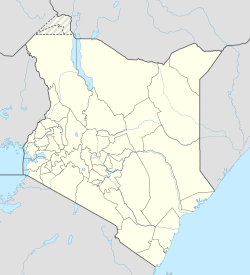Nyeri, Kenya
| Nyeri | |
|---|---|
| City | |

A street in the center of Nyeri
|
|
| Location of Nyeri | |
| Coordinates: 0°25′S 36°57′E / 0.417°S 36.950°ECoordinates: 0°25′S 36°57′E / 0.417°S 36.950°E | |
| Country |
|
| County | Nyeri County |
| Population (2009) | |
| • Total | 225,357 |
| Time zone | EAT (UTC+3) |
| Climate | Cfb |
Nyeri town is a town situated in the Central Highlands of Kenya. It is the county headquarters of Nyeri County. It is one of the oldest towns in Kenya having been established in the British colonial era in Kenya. The town was the central administrative headquarters of the country's former Central Province. Following the dissolution of the former provinces by Kenya's new constitution on 26 August 2010, Nyeri town is now the largest city in the newly created Nyeri County.
Nyeri town is the birth place of the Boy Scout movement and hosts the tomb of the founder Lord Baden Powell. It is also the home town the late Nobel laureate Wangari Maathai.
Nyeri's Roman Catholic Cathedral also hosts the tomb of Blessed Irene Stefani "Nyaatha" who was beatified on 23 May 2015 in Nyeri.
The town is also the home of the famous national university of technology: Dedan Kimathi University of Technology DeKUT founded by the local community in the early 1970s as an institute of technology and converted into a fully fledged university in 2007
The city is situated about 150 km (a two-hour drive) north of Kenya's capital Nairobi, in the country's densely populated and fertile Central Highlands, lying between the eastern base of the Aberdare (Nyandarua) Range, which forms part of the eastern end of the Great Rift Valley, and the western slopes of Mount Kenya.
The city population, according to the 2009 Kenya Population and Housing Census, was estimated at 225,357. There is, however, a significant population of primarily Government and corporate workers who ordinarily reside in Nyeri but who, during the census, choose to be counted in their areas of origin or the areas where their families are residents.
Nyeri town's central business district is relatively small as compared to other cities in, for instance Mombasa and Kisumu. While small business activities are vibrant, Nyeri is essentially a government administration city.
The town has a relatively low cost of living in comparison to Nairobi and other major urban centers in Kenya. Located in Kenya's fertile highlands, food and water are plentiful and relatively cheap.
Towards the end of 1902, as the British were establishing their colonial presence, Richard Meinertzhagen marched a strong military column meeting spirited resistance from the native Kikuyu warriors led by Wangombe Wa Ihura. The Kikuyu were eventually defeated. After Meinertzhagen's victory, a decision was reached to site a British post close to a little hill on the slopes of Mt. Kenya. The Kikuyu called the hill Kia-Nyiri while their Maasai neighbours called the hill Na-aier. The post took its name from the little hill. On 18 December 1902, Nyeri was founded.
...
Wikipedia

